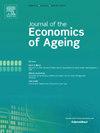提高社会保障的完全退休年龄对老年人失业的影响
IF 2
3区 经济学
Q2 DEMOGRAPHY
引用次数: 0
摘要
2000年,社会保障开始逐步将完全退休年龄(FRA)从65岁提高到67岁。虽然先前的研究表明,这项改革增加了老年人的就业和劳动力供应,但它对老年工人失业的影响有限。随着老年人就业率的上升,老年人面临失业时期的风险也在增加。此外,如果人们选择策略性地保持失业状态,以领取失业保险(UI)福利,并推迟申领社会保障,他们可能会经历更长的失业期。这项研究使用了当前人口调查(CPS)的数据来检验提高联邦存款准备金率对1932年至1940年间出生的老年男性失业率的影响。研究结果表明,在fra较高的人群中,失业率略有上升。然而,这种增长并没有转化为更长的失业期。相反,在接受治疗的人群中,62岁至65岁的失业人员更有可能从失业转向就业,而不是继续失业或退休。此外,也没有强有力的证据表明用户界面是战略性使用的。结果表明,由于提前申请社会保障而受到更大惩罚的个人,在劳动力市场停留的时间越长,失业率就越高,而不是通过任何战略努力来领取失业救济金。本文章由计算机程序翻译,如有差异,请以英文原文为准。
The effect of the increase in social security’s full retirement age on unemployment among older adults
Social Security began to gradually raised the Full Retirement Age (FRA) from 65 to 67 in 2000. While previous research has shown that this reform increased employment and labor supply among older adults, its impact on unemployment among older workers is limited. As employment rises among older individuals, there is an increased risk of facing periods of unemployment at older ages. In addition, people may experience longer unemployment spells if they choose to stay unemployed strategically in order to collect Unemployment Insurance (UI) benefits and delay claiming Social Security. This study uses data from the Current Population Survey (CPS) to examine the effect of raising the FRA on unemployment among older men born between 1932 and 1940. The findings indicate a slight increase in unemployment among cohorts with higher FRAs. However, this increase does not translate into longer unemployment spells. Instead, unemployed individuals aged 62 to 65 in the treated cohorts are more likely to move from unemployment to employment, rather than remaining unemployed or retiring. Moreover, there is no strong evidence of strategic use of UI. The results suggest that individuals subject to greater penalties for early Social Security claiming experience higher unemployment as they stay longer in the labor market, rather than through any strategic effort to collect UI benefits.
求助全文
通过发布文献求助,成功后即可免费获取论文全文。
去求助
来源期刊

Journal of the Economics of Ageing
Multiple-
CiteScore
4.10
自引率
4.50%
发文量
46
审稿时长
49 days
期刊介绍:
The Journal of the Economics of Ageing (JEoA) is an international academic journal that publishes original theoretical and empirical research dealing with the interaction between demographic change and the economy. JEoA encompasses both microeconomic and macroeconomic perspectives and offers a platform for the discussion of topics including labour, health, and family economics, social security, income distribution, social mobility, immigration, productivity, structural change, economic growth and development. JEoA also solicits papers that have a policy focus.
 求助内容:
求助内容: 应助结果提醒方式:
应助结果提醒方式:


